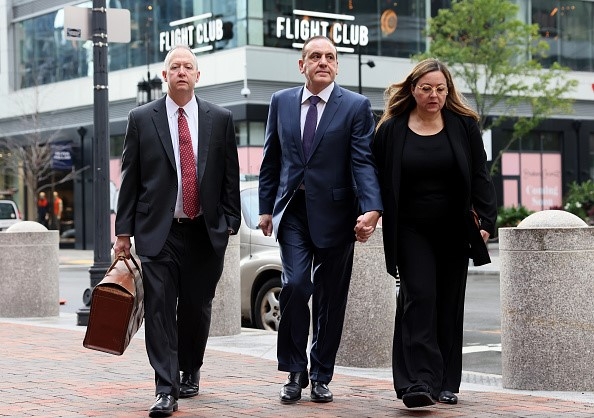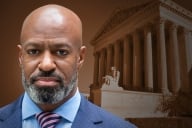You have /5 articles left.
Sign up for a free account or log in.

Gamal Abdelaziz (center) makes his way to court for the trial.
The Boston Globe / Getty Images
A federal jury today convicted two wealthy fathers of illegally paying bribes to get their children admitted to the University of Southern California.
Gamal Abdelaziz and John Wilson, both prominent businessmen, paid hundreds of thousands of dollars to Rick Singer -- the mastermind behind the admissions scandal -- and to USC in the cases. Some of the funds went to USC coaches as payment for accepting students on athletic teams for which they were not qualified to play, and did not play.
Their trial was the first in the scandal, which became public in March of 2019, when the first 50 people were indicted.
Abdelaziz and Wilson were the first to opt for a trial. Thirty-three parents have pled guilty to charges related to paying to have their children admitted to college. In some cases, the funds were used to bribe coaches to list the child as a recruited athlete -- even though the children didn't play the sports. In other cases, the bribes involved paying proctors to change SAT or ACT scores. Some of the parents admitted to both kinds of misconduct. President Trump pardoned one of those facing charges.
During the trial, prosecutors suggested that Abdelazziz and Wilson engaged in the same sort of bribery as the other parents. But lawyers for Abdelazis and Wilson suggested that they thought the payments they made were simply the way wealthy people worked with colleges to which they wished to send their children.
Indeed the case -- whether you think the defendants were guilty or not -- focused attention on wealth in the admissions process. And while bribery may be illegal, there are numerous ways that colleges favor wealthy applicants in admissions. These range from where colleges recruit (wealthy high schools), to early decision (wealthy students are more likely to apply early), to legacy preferences (which help a disproportionately wealthy subset of the applicant pool) to high school counselors (weathy students have access to private counselors and also have more counselors per student at high school than low-income students). All of those policies are completely legal.
In the trial, Abdelaziz faced charges of conspiracy to commit mail and wire fraud and honest services mail and wire fraud and conspiracy to commit federal programs bribery. Wilson faced those charges and also a charge of filing a false tax return.
The trial featured recordings of Singer and Wilson talking about the costs of bribing one's way into Harvard University -- Singer claimed he could do it for the right price, but the scandal did not produce anyone who did that. In this recording by GBH, Singer talks about money opening "the side door" to college, and how it doesn't matter which sport they will pretend will work for Wilson's children.
In their closing arguments, The New York Times reported, Michael Kendall, Wilson’s lawyer, said, “John is not part of Singer’s con. There is no evidence, not even a hint, that John figured out Singer’s scam."
But Stephen Frank, the assistant U.S. attorney who delivered the closing argument for the government, said it didn't matter that the recordings don't show Wilson using a word like "bribery." Said Frank: "They don’t use the word ‘bribe,’ they don’t use the word ‘fake profile,’ because that’s not how criminals talk."








